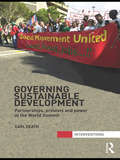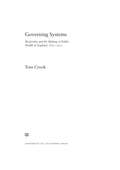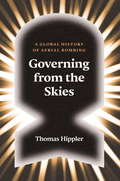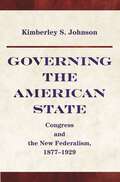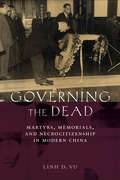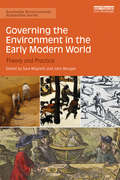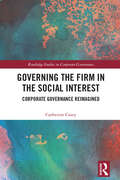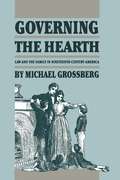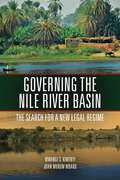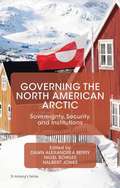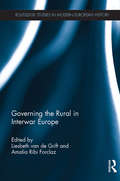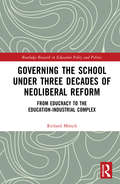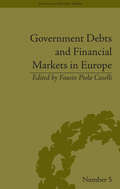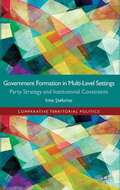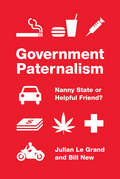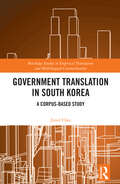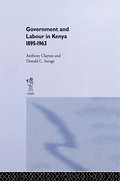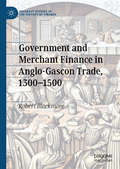- Table View
- List View
Governing Sustainable Development: Partnerships, Protests and Power at the World Summit (Interventions)
by Carl DeathMultilateral UN summits from Stockholm to Copenhagen have set the pace and direction for the global governance of sustainable development. The 2002 Johannesburg World Summit on Sustainable Development (WSSD) was a key moment in the evolution of sustainable development as a discourse and summitry as a technology of government. It firmly established multi-stakeholder partnerships, carbon-trading and communication strategies as primary techniques for dealing with environmental crises. It was also a significant event in terms of South African domestic politics, witnessing some of the largest protests since the end of Apartheid. Carl Death draws on Foucauldian governmentality literature to argue that the Johannesburg Summit was a key site for the refashioning of sustainable development as advanced liberal government; for the emergence of an exemplary logic of rule; and for the mutually interdependent relationship between ‘mega-events’ (summits, world cups, Olympic games) and ‘mega-protests’ understood as Foucauldian counter-conducts. Analysing detailed and original research on the WSSD, Death argues that summits work to make politically sustainable a global order which is manifestly unsustainable. Paradoxically however, they also provide opportunities for the status quo to be protested and resisted. This work will be of great interest to scholars of development studies, global governance and environmental politics.
Governing Systems: Modernity and the Making of Public Health in England, 18301910
by Tom CrookWhen and how did public health become modern? In Governing Systems, Tom Crook offers a fresh answer to this question through an examination of Victorian and Edwardian England, long considered one of the critical birthplaces of modern public health. This birth, Crook argues, should be located not in the rise of professional expertise or a centralized bureacratic state, but in the contested formation and functioning of multiple systems, both human and material, administrative and technological. Theoretically ambitious but empirically grounded, Governing Systems will be of interest to historians of modern public health and modern Britain, as well as to anyone interested in the complex gestation of the governmental dimensions of modernity.
Governing The Press: Media Freedom In The U.s. And Great Britain
by Deborah HolmesJealously guarded and frequently defended, the concept of freedom of the press is still subject to widely varying interpretations in different democratic systems. This book compares and contrasts the ways in which the system limits and defines press freedom in two nations known for an unfettered press-the United States and Great Britain. Examining
Governing from the Skies: A Global History of Aerial Bombing
by Thomas HipplerThe history of the war from the past one hundred years is a history of bombingEver since its invention, aviation has embodied the dream of perpetual peace between nations, yet the other side of this is the nightmare of an unprecedented deadly power. A power initially deployed on populations that the colonizers deemed too restive, it was then used to strike the cities of Europe and Japan during World War II.With air war it is now the people who are directly taken as target, the people as support for the war effort, and the sovereign people identified with the state. This amounts to a democratisation of war, and so blurs the distinction between war and peace.This is the political shift that has led us today to a world governance under United States hegemony defined as 'perpetual low-intensity war', which is presently striking regions such as Yemen and Pakistan, but which tomorrow could spread to the whole world population.Air war thus brings together the major themes of the past century: the nationalization of societies and war, democracy and totalitarianism, colonialism and decolonization, Third World-ism and globalization, and the welfare state and its decline in the face of neoliberalism. The history of aerial bombing offers a privileged perspective for writing a global history of the twentieth century.From the Hardcover edition.
Governing the American State: Congress and the New Federalism, 1877-1929 (Princeton Studies in American Politics: Historical, International, and Comparative Perspectives #91)
by Kimberley S. JohnsonThe modern, centralized American state was supposedly born in the Great Depression of the 1930s. Kimberley S. Johnson argues that this conventional wisdom is wrong. Cooperative federalism was not born in a Big Bang, but instead emerged out of power struggles within the nation's major political institutions during the late nineteenth and early twentieth centuries. Examining the fifty-two years from the end of Reconstruction to the beginning of the Great Depression, Johnson shows that the "first New Federalism" was created during this era from dozens of policy initiatives enacted by a modernizing Congress. The expansion of national power took the shape of policy instruments that reflected the constraints imposed by the national courts and the Constitution, but that also satisfied emergent policy coalitions of interest groups, local actors, bureaucrats, and members of Congress. Thus, argues Johnson, the New Deal was not a decisive break with the past, but rather a superstructure built on a foundation that emerged during the Gilded Age and the Progressive Era. Her evidence draws on an analysis of 131 national programs enacted between 1877 and 1930, a statistical analysis of these programs, and detailed case studies of three of them: the Federal Highway Act of 1916, the Food and Drug Act of 1906, and the Sheppard-Towner Act of 1921. As this book shows, federalism has played a vital but often underappreciated role in shaping the modern American state.
Governing the Dead: Martyrs, Memorials, and Necrocitizenship in Modern China
by Linh D. VuIn Governing the Dead, Linh D. Vu explains how the Chinese Nationalist regime consolidated control by honoring its millions of war dead, allowing China to emerge rapidly from the wreckage of the first half of the twentieth century to become a powerful state, supported by strong nationalistic sentiment and institutional infrastructure. The fall of the empire, internecine conflicts, foreign invasion, and war-related disasters claimed twenty to thirty million Chinese lives. Vu draws on government records, newspapers, and petition letters from mourning families to analyze how the Nationalist regime's commemoration of the dead and compensation of the bereaved actually fortified its central authority. By enshrining the victims of violence as national ancestors, the Republic of China connected citizenship to the idea of the nation, promoting loyalty to the "imagined community." The regime constructed China's first public military cemetery and hundreds of martyrs' shrines, collectively mourned millions of fallen soldiers and civilians, and disbursed millions of yuan to tens of thousands of widows and orphans. The regime thus exerted control over the living by creating the state apparatus necessary to manage the dead. Although the Communist forces prevailed in 1949, the Nationalists had already laid the foundation for the modern nation-state through their governance of dead citizens. The Nationalist policies of glorifying and compensating the loyal dead in an age of catastrophic destruction left an important legacy: violence came to be celebrated rather than lamented.
Governing the Environment in the Early Modern World: Theory and Practice (Routledge Environmental Humanities)
by John Morgan Sara MigliettiThroughout the early modern period, scientific debate and governmental action became increasingly preoccupied with the environment, generating discussion across Europe and the wider world as to how to improve land and climate for human benefit. This discourse eventually promoted the reconsideration of long-held beliefs about the role of climate in upholding the social order, driving economies and affecting public health. Governing the Environment in the Early Modern World explores the relationship between cultural perceptions of the environment and practical attempts at environmental regulation and change between 1500 and 1800. Taking a cultural and intellectual approach to early modern environmental governance, this edited collection combines an interpretative perspective with new insights into a period largely unfamiliar to environmental historians. Using a rich and multifaceted narrative, this book offers an understanding as to how efforts to enhance productive aspects of the environment were both led by and contributed to new conceptualisations of the role of ‘nature’ in human society. This book offers a cultural and intellectual approach to early modern environmental history and will be of special interest to environmental, cultural and intellectual historians, as well as anyone with an interest in the culture and politics of environmental governance.
Governing the Firm in the Social Interest: Corporate Governance Reimagined (Routledge Studies in Corporate Governance)
by Catherine CaseyThe corporate business enterprise is a core institution of capitalism. It holds immense political, economic, and cultural power in society. It mobilizes social and planetary resources to its utility in pursuit of private profit maximization and with little regard for social concerns. Its influence over so much of societal life and effects on the natural environment raise critical questions about the firm and its governance in democratic society. Various voices seek reforms of regulation and corporate governance practices to those shaped by the neoliberal policies persisting in the current decades. But prospects for amelioration within our current horizons of thinking appear elusive. This book contributes a distinctly social theoretical approach to the social problem of governing the firm. Its discussions complement debates in economics, politics, and law. Its critical social theorizations challenge conventional understandings of the firm and neoliberal legitimacies of its governance and posit alternatives. The book explores the social relations and moral fabric of the firm and the creativity of human action at work. It proposes a reimagined corporate governance premised on just recognition of that social vitality. It invites unprecedented collaboration for a robust participatory democracy for governing the firm and market action oriented to ecological and social sustainability.
Governing the Future: Digitalization, Artificial Intelligence, Dataism (CRC Press Reference Books in Computer Science)
by Henning Glaser Pindar WongWe are living in times of deep and disruptive change. Perhaps the most powerful vector of this change can be described by three related catchphrases: digitalization, artificial intelligence, and dataism. Drawing on considerable expertise from a wide range of scholars and practitioners, this interdisciplinary collection addresses the challenges, impacts, opportunities and regulation of this civilizational transformation from a variety of angles, including technology, philosophy, cultural studies, international law, sociology and economics. This book will be of special interest to scholars, students, analysts, policy planners, and decision-makers in think tanks, international organizations, and state agencies studying and dealing with the development and governance of disruptive technologies.
Governing the Hearth
by Michael GrossbergPresenting a new framework for understanding the complex but vital relationship between legal history and the family, Michael Grossberg analyzes the formation of legal policies on such issues as common law marriage, adoption, and rights for illegitimate children. He shows how legal changes diminished male authority, increased women's and children's rights, and fixed more clearly the state's responsibilities in family affairs. Grossberg further illustrates why many basic principles of this distinctive and powerful new body of law--antiabortion and maternal biases in child custody--remained in effect well into the twentieth century.
Governing the Nile River Basin
by John Mbaku Mwangi KimenyiThe effective and efficient management of water is a major problem, not just for economic growth and development in the Nile River basin, but also for the peaceful coexistence of the millions of people who live in the region. Of critical importance to the people of this part of Africa is the reasonable, equitable and sustainable management of the waters of the Nile River and its tributaries.Written by scholars trained in economics and law, and with significant experience in African political economy, this book explores new ways to deal with conflict over the allocation of the waters of the Nile River and its tributaries. The monograph provides policymakers in the Nile River riparian states and other stakeholders with practical and effective policy options for dealing with what has become a very contentious problem--the effective management of the waters of the Nile River. The analysis is quite rigorous but also extremely accessible.
Governing the Nile River Basin
by John Mbaku Mwangi KimenyiThe effective and efficient management of water is a major problem, not just for economic growth and development in the Nile River basin, but also for the peaceful coexistence of the millions of people who live in the region. Of critical importance to the people of this part of Africa is the reasonable, equitable and sustainable management of the waters of the Nile River and its tributaries.Written by scholars trained in economics and law, and with significant experience in African political economy, this book explores new ways to deal with conflict over the allocation of the waters of the Nile River and its tributaries. The monograph provides policymakers in the Nile River riparian states and other stakeholders with practical and effective policy options for dealing with what has become a very contentious problem-the effective management of the waters of the Nile River. The analysis is quite rigorous but also extremely accessible.
Governing the North American Arctic: Lessons From The Past, Prospects For The Future (St Antony's)
by Nigel Bowles Halbert Jones Dawn BerryThough it has been home for centuries to indigenous peoples who have mastered its conditions, the Arctic has historically proven to be a difficult region for governments to administer. Extreme temperatures, vast distances, and widely dispersed patterns of settlement have made it impossible for bureaucracies based in far-off capitals to erect and maintain the kind of infrastructure and institutions that they have built elsewhere. As climate change transforms the polar regions, this book seeks to explore how the challenges of governance are developing and being met in Alaska, the Canadian Far North, and Greenland, while also drawing upon lessons from the region's past. Though the experience of each of these jurisdictions is unique, their place within democratic, federal systems and the prominence within each of them of issues relating to the rights of indigenous peoples situates them as part of an identifiably 'North American Arctic.' Today, as this volume shows, their institutions are evolving to address contemporary issues of security, environmental protection, indigenous rights, and economic development.
Governing the Rural in Interwar Europe (Routledge Studies in Modern European History)
by Liesbeth van de Grift Amalia Ribi ForclazThis book examines how rural Europe as a hybrid social and natural environment emerged as a key site of local, national and international governance in the interwar years. The post-war need to secure and intensify food production, to protect contested border areas, to improve rural infrastructure and the economic viability of rural regions and to politically integrate rural populations, gave rise to a variety of schemes aimed at modernizing agriculture and remaking rural society. The volume examines discourses, institutions and practices of rural governance from a transnational perspective, revealing striking commonalities across national and political boundaries. From the village town hall to the headquarters of international organizations, local authorities, government officials and politicians, scientific experts and farmers engaged in debates about the social, political and economic future of rural communities. They sought to respond to both real and imagined concerns over poverty and decline, backwardness and insufficient control, by conceptualizing planning and engineering models that would help foster an ideal rural community and develop an efficient agricultural sector. By examining some of these local, national and international schemes and policies, this volume highlights the hitherto under-researched interaction between policymakers, experts and rural inhabitants in the European countryside of the 1920s and '30s.
Governing the School under Three Decades of Neoliberal Reform: From Educracy to the Education-Industrial Complex (Routledge Research in Education Policy and Politics)
by Richard MünchThis book provides a critical analysis of the neoliberal reform agenda of the economic governance of schools. Focusing on the role of the United States in this process, it explores the transformation of schools in this agenda from educational establishments to enterprises in a competitive education market. The study uses Bourdieu to apply a field-theoretical framework to a detailed empirical analysis of the current changes of school government. Chapters explore education bureaucracy, reform and the effect of outside organizations on pedagogy and testing. The book reveals how far the promises of corporate education reform are from reality and concludes with a plea for a realistic view of school’s capabilities. It goes beyond the state of the art with its focus on how the governance of education, school and instruction is changing with the replacement of educracy by an education-industrial complex. The book will be of great interest for academics, postgraduate students, administrators and politicians in the field of education policy, the governance of school systems and schools. The book also has an international appeal as it studies a global transformation of the field of education.
Governing the World: The History of an Idea, 1815 to the Present
by Mark MazowerThe story of global cooperation between nations and peoples is a tale of dreamers goading us to find common cause in remedying humanity’s worst problems. But international institutions have also provided a tool for the powers that be to advance their own interests and stamp their imprint on the world. Mark Mazower’s Governing the World tells the epic story of that inevitable and irresolvable tension—the unstable and often surprising alchemy between ideas and power. From the beginning, the willingness of national leaders to cooperate has been spurred by crisis: the book opens in 1815, amid the rubble of the Napoleonic Empire, as the Concert of Europe was assembled with an avowed mission to prevent any single power from dominating the continent and to stamp out revolutionary agitation before it could lead to war. But if the Concert was a response to Napoleon, internationalism was a response to the Concert, and as courts and monarchs disintegrated they were replaced by revolutionaries and bureaucrats. 19th century internationalists included bomb-throwing anarchists and the secret policemen who fought them, Marxist revolutionaries and respectable free marketeers. But they all embraced nationalism, the age’s most powerful transformative political creed, and assumed that nationalism and internationalism would go hand in hand. The wars of the twentieth century saw the birth of institutions that enshrined many of those ideals in durable structures of authority, most notably the League of Nations in World War I and the United Nations after World War II. Throughout this history, we see that international institutions are only as strong as the great powers of the moment allow them to be. The League was intended to prop up the British empire. With Washington taking over world leadership from Whitehall, the United Nations became a useful extension of American power. But as Mazower shows us, from the late 1960s on, America lost control over the dialogue and the rise of the independent Third World saw a marked shift away from the United Nations and toward more pliable tools such as the World Bank and the International Monetary Fund. From the 1990s to 2007, Governing the World centers on a new regime of global coordination built upon economic rule-making by central bankers and finance ministers, a regime in which the interests of citizens and workers are trumped by the iron logic of markets. Now, the era of Western dominance of international life is fast coming to an end and a new multi-centered global balance of forces is emerging. We are living in a time of extreme confusion about the purpose and durability of our international institutions. History is not prophecy, but Mark Mazower shows us why the current dialectic between ideals and power politics in the international arena is just another stage in an epic two-hundred-year story. .
Government
by B. TravenB. Traven's magnum opus was a six-volume work of historical fiction recounting the Mexican revolution of 1910. "Government" sets the scene by describing the plight of the indigenous peoples who were ruthlessly exploited by a government completely corrupt at every level from the presidency to the village "secretaries".
Government Debts and Financial Markets in Europe (Financial History #5)
by Fausto Piola CaselliContains essays by historians of economic and financial history. It illuminates the relationships between government indebtedness and the development of financial markets in Europe from the late Middle Ages to the late twentieth century.
Government Formation in Multi-Level Settings
by Irina StefuriucThis book examines how parties negotiate coalition deals at the subnational level using the examples of Germany and Spain. In such multi-level settings, parties are present at various negotiation tables often having to make difficult choices about their role in the coalition and the relative merits of being in government over the opposition.
Government In America: People, Politics And Policy
by Martin P. Wattenberg Robert L. Lineberry George C. EdwardsAn undergraduate text concentrating on constitutional foundations, patterns of political behavior, political institutions, and public policy outputs. Contains chapter summaries, key terms, and discussion questions, and boxes on politics since the 1960s; public opinion; comparison of the US with other nations in areas such as tax rates. Includes color photos and graphics. This second edition expands coverage of theories of democracy; fiscal federalism; the Constitution and religion; the media; and candidate-centered politics. Annotation c. by Book News, Inc. , Portland, Or.
Government Paternalism
by Julian Le Grand Bill NewShould governments save people from themselves? Do governments have the right to influence citizens' behavior related to smoking tobacco, eating too much, not saving enough, drinking alcohol, or taking marijuana--or does this create a nanny state, leading to infantilization, demotivation, and breaches in individual autonomy? Looking at examples from both sides of the Atlantic and around the world, Government Paternalism examines the justifications for, and the prevalence of, government involvement and considers when intervention might or might not be acceptable. Building on developments in philosophy, behavioral economics, and psychology, Julian Le Grand and Bill New explore the roles, boundaries, and responsibilities of the government and its citizens.Le Grand and New investigate specific policy areas, including smoking, saving for pensions, and assisted suicide. They discuss legal restrictions on risky behavior, taxation of harmful activities, and subsidies for beneficial activities. And they pay particular attention to "nudge" or libertarian paternalist proposals that try to change the context in which individuals make decisions so that they make the right ones. Le Grand and New argue that individuals often display "reasoning failure": an inability to achieve the ends that they set themselves. Such instances are ideal for paternalistic interventions--for though such interventions might impinge on autonomy, the impact can be outweighed by an improvement in well-being.Government Paternalism rigorously considers whether the state should guide citizen decision making in positive ways and if so, how this should be achieved.
Government Translation in South Korea: A Corpus-based Study (Routledge Studies in Empirical Translation and Multilingual Communication)
by Jinsil ChoiGovernment Translation in South Korea: A Corpus-based Study is the first book to investigate and discuss translation processes and translation products in South Korean government institutions, employing a parallel corpus-based approach. Choi identifies different agents and procedures involved in institutional translation practices, discusses linguistic and genre features of translations, and investigates changes made in translations compared to the original documents, during the two Korean presidencies of Lee Myung-bak (2008–2013) and Park Geun-hye (2013–2017). Choi’s book explores important facets of Korean government translation in the belief that practices associated with the normative meaning and concept of government translation have to be displaced into the wider understanding of the concept of translation as a social construct. Drawing on the theoretical frameworks of institutional translation and critical discourse analysis–informed corpus-based translation studies, the chapters discuss the practice, process and products of Korean government translation. The Korean–English parallel corpus methodology used introduces a systemic way to analyse changes in Korean government translations, based on a personally built sentence-level tagged corpus, both qualitatively and quantitatively. This volume will be of great interest to scholars and students of translation studies as well as Korean studies.
Government and Labour in Kenya 1895-1963
by Anthony Clayton Donald Cockfield SavagePublished in the year 1974, Government and Labour in Kenya is a valuable contribution to the field of History.
Government and Markets: Toward a New Theory of Regulation
by Edward J. Balleisen David A. MossAfter two generations of emphasis on governmental inefficiency and the need for deregulation, we now see growing interest in the possibility of constructive governance, alongside public calls for new, smarter regulation. Yet there is a real danger that regulatory reforms will be rooted in outdated ideas. As the financial crisis has shown, neither traditional market failure models nor public choice theory, by themselves, sufficiently inform or explain our current regulatory challenges. Regulatory studies, long neglected in an atmosphere focused on deregulatory work, is in critical need of new models and theories that can guide effective policy-making. This interdisciplinary volume points the way toward the modernization of regulatory theory. Its essays by leading scholars move past predominant approaches, integrating the latest research about the interplay between human behavior, societal needs, and regulatory institutions. The book concludes by setting out a potential research agenda for the social sciences.
Government and Merchant Finance in Anglo-Gascon Trade, 1300–1500 (Palgrave Studies in the History of Finance)
by Robert BlackmoreThe Late Middle Ages (c.1300–c.1500) saw the development of many of the key economic institutions of the modern unitary nation-state in Europe. After the ‘commercial revolution’ of the thirteenth century, taxes on trade became increasingly significant contributors to government finances, and as such there were ever greater efforts to control the flow of goods and money.This book presents a case study of the commercial and financial links between the kingdom of England and the duchy of Aquitaine across the late-medieval period, with a special emphasis on the role of the English Plantagenet government that had ruled both in a political union since 1154. It establishes a strong connection between fluctuations in commodity markets, large monetary flows and unstable financial markets, most notably in trade credit and equity partnerships.It shows how the economic relationship deteriorated under the many exogenous shocks of the period, the wars, plagues and famines, as well as politically motivated regulatory intervention. Despite frequent efforts to innovate in response, both merchants and governments experienced a series of protracted financial crises that presaged the break-up of the union of kingdom and duchy in 1453, with the latter’s conquest by the French crown. Of particular interest to scholars of the late-medieval European economy, this book will also appeal to those researching wider economic or financial history.
